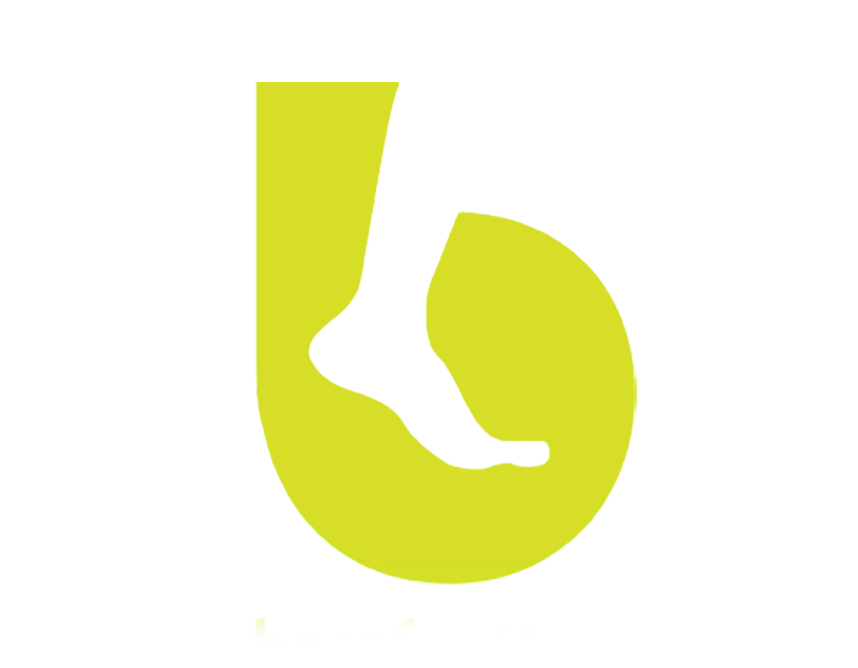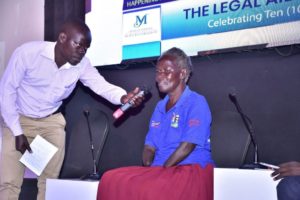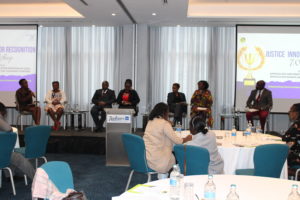BALA TOWN COUNCIL, KOLE DISTRICT, UGANDA– Families like Imat Midi Awor’s, her daughter, Catherine’s and three grandchildren can now access uninterrupted legal support at the BarefootLaw Box, because of the reliable power provided by what BarefootLaw has termed, the ‘Justice Microgrid.’ This project is the result of a partnership between BarefootLaw and The Solar Electric Light Fund (SELF).

Figure 1 The thirty (30)-panel photovoltaic (PV) system at the BarefootLaw Box in Bala
The ‘Justice Microgrid’ is the first-of-its-kind thirty (30)-panel photovoltaic (PV) system which generates 14.25 kW of energy, enough to light up and power The BarefootLaw Box and the justice ecosystem surrounding it, including the nearby police station, the Town Council Hall which handles court sessions, and some Local Government offices. More importantly, the generated solar power will light up dark walkways, especially around the community market and water collection points, which have been notorious for crimes against women due to the darkness. This is a preventative approach to justice, as opposed to the usual prescriptive approach.

Figure 2 Street lights installed at the market area by the water collection point in Bala.
“In a remote community like Bala, access to light is synonymous with access to justice,” Gerald Abila, BarefootLaw’s Founder and Chief Executive Officer (CEO) states.
Figure 3The BarefootLaw Box lit by the solar power.
The BarefootLaw Box is a recycled shipping container, repurposed into a cost-efficient and high-impact way to extend technology to rural hard-to-reach communities to enhance access to justice. It is fitted with screens, through which people are connected to lawyers, hundreds of miles away, free of charge. The BarefootLaw Box in Bala is one of three (3), with the others located in Acholi and Busoga sub-regions.

The unreliable power in Bala, like many rural communities in Uganda, stalls development and justice along with it. The country heavily depends on hydro-generated electricity as a source of power, all generated by the Uganda Electricity Generation Company Limited (UEGCL). It generates 200MW at Kiira and 180MW from Nalubaale power plants. The Uganda Electricity Transmission Company Limited (UETCL), the bulk supplier and single buyer of power for the national grid, then purchases and redistributes it through a private entity, UMEME.
The Government of Uganda, under the Ministry of Energy and Mineral development established the Rural Electrification Agency (REA), in accordance with Section 62 of the Electricity Act. It is a semi-autonomous Agency which operationalises the Government’s rural electrification function under a public-private partnership. Even with all these efforts, accessing electricity remains expensive and unreliable for many Ugandans, especially those living in remote areas like Bala.
“You can have an incredible resource like the BarefootLaw Box, but without reliable power, it doesn’t matter,” says Robert Freling, SELF’s executive director. “Unreliable grids are all too common in these rural communities, and it obstructs access to crucial services. It’s a major problem, but fortunately, it’s one we can solve.”
The availability of power at the BarefootLaw Box, enables the smooth running of legal support services such as free virtual legal consultations with lawyers, electronically generated letters inviting parties for mediation sessions, lighting security lights and a place for the community to charge their mobile phones.
Imat Midi narrates, “I came to the BarefootLaw Box to collect my mediation invitation letter after my brothers had taken away my animals,but couldn’t access the letter for almost one week because there was no power.” She walks for nearly four (4) Kilometres every time she needs to access the BarefootLaw Box, but all her effort is in vain if the power supply is cut off.

Figure 4 Imat Midi (White) participating a mediation session between her daughter, the father of her daughter’s child and lawyers at the BarefootLaw Box.
Today, 24th May 2024, as the domestic solar installation constructor, All in Trade, hands over the completed and functional solar project back to BarefootLaw, Imat Midi and the nearly five thousand (4855) other people who have been served by the BarefootLaw Box to date, will enjoy uninterrupted access to all-round legal support services.
Abila, concludes. “By providing reliable solar-powered lights, we can significantly reduce the occurrence of various justice issues. Our hope is that this initiative will not only supply the BFL Box with reliable and environmentally friendly power but also lead to a safer and more just environment for all, ”

Figure 5 Gerald Abila, BarefootLaw CEO and Founder, poses with the solar site engineers.
By: Getrude Too-rom Lamunu
Director of Communications BarefootLaw
About BarefootLaw
BarefootLaw is a nonprofit organisation, which uses technology and innovation to bridge the gap between people and justice. The organisation was founded in 2013 and has since provided simplified legal information and guidance to remote communities in Uganda, Malawi and Kenya through technology-enabled legal support and recently via “The BarefootLaw Box”- mobile offices and mediation centres. Through tools such as SMS, toll-free numbers, and AI-powered systems, BarefootLaw’s efforts attract people, especially women, in rural areas and youth in urban and semi-urban areas. Learn more at: www.barefootlaw.org
About the Solar Electric Light Fund (SELF)
The Solar Electric Light Fund (SELF) is a Washington, D.C.-based non-profit that uses solar energy to fight poverty and climate change. Since its founding in 1990, SELF has worked in dozens of countries, bringing clean energy where it’s needed most. Whether powering schools in South Africa, or health clinics in Haiti, SELF uses the power of the sun to drive lasting change. Learn more at: www.self.org











